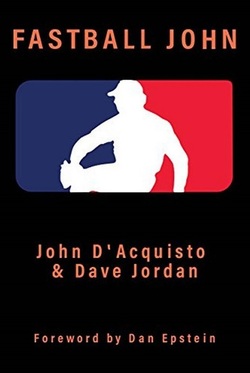
And for the past 25 years, sports lovers have been bombarded by baseball autobiographies from stars, managers, Hall of Famers and even umpires. Many were simply cashing in on their current fame; others had long careers and were trying to nail down their legacies in print.
Meanwhile, R.A. Dickey wrote a harrowing autobiography in 2012 (Wherever I Wind Up) and Dirk Hayhurst’s candid and funny Out of My League was released the same year.
The point to this ramble is that good baseball biographies are hard to find. When one appears, it’s an occasion to savor.
That’s the case with John D’Acquisto’s memoir.
Fastball John (Instream Books; paperback; $20.99, $9.98 Kindle; 542 pages), co-written with Dave Jordan, takes the reader into the locker room and presents a view from a journeyman’s eyes. And D’Acquisto had quite a journey, rising from the minors and pitching for six major-league teams over 10 seasons.
He managed a 34-51 record with a 4.56 ERA, but numbers don’t tell D’Acquisto’s story. He was a 6-foot-2, 205-pound right-hander with an eye-popping fastball that could top 100 mph. But elbow woes and Tommy John surgery derailed a career that seemed so bright.
D’Acquisto had been a No. 1 pick of the San Francisco Giants (and 17th overall) in 1970. As a minor-leaguer, he had back-to-back seasons (1971-72) where he struck out more than 240 batters in a season. D’Acquisto takes the reader through his growing pains in the minors, his relationship with future major-leaguers like Goose Gossage and Gorman Thomas, and his eventual promotion to the majors to pitch for his mentor, Giants manager Charlie Fox.
There were a lot of fun times in pro ball. There was drinking, plenty of music — D’Acquisto peppers his prose with plenty of iconic songs from the 1970s (“throughout my life, the music playing in the car set the tone for my day”) — and a good deal of women he met on the road. D’Acquisto goes into enough detail to let the reader know what happened, but is sensitive enough to change the names of his partners.
D’Acquisto really excels as a storyteller in Fastball John. His blow-by-blow account of his first pitching duel against Hall of Famer Bob Gibson in 1974 is riveting, and the aftermath might be surprising to some — but not to those who knew what kind of competitor Gibson was. Whether watching Sam McDowell chugging half a bottle of vodka or throwing a no-hitter for Triple-A Phoenix in early 1973, D’Acquisto is engaging with vivid detail.
And he uses music to convey his emotions. When he was called up to the Giants in 1973 and was flying to San Francisco from Phoenix, D’Acquisto was “floating in a tin can, far above the world” — a nice nod to David Bowie’s “Space Oddity.”
After waking from his Tommy John surgery, he observes that “for an instant you’re relieved that this was the ugliest, most vivid dream you’ve ever experienced.” But that was OK because soon he’d be driving to the ballpark, “rocking the Led Zeppelin.” It didn’t happen, because D’Acquisto suddenly found himself on the disabled list.
He talks about the time he refused to come out of a ballgame, telling Cardinals manager Vern Rapp to get off the mound. D’Acquisto was throwing a no-hitter at the time.
“This was the only time, the only time, in my professional life, where I didn’t do what I was told,” he writes.
Didn’t matter. He knew he was being showcased for a trade, and it happened within 72 hours as he was shipped to his hometown team, the San Diego Padres.
Some of D’Acquisto’s adventures away from the ballpark were just as intriguing. There was Italian restaurant he helped bankroll, frequented by a famous mobster. There was his work as a player rep during the talks that led to the 1981 baseball strike, which essentially ended his major-league career.
Life after baseball wasn’t especially kind to D’Acquisto, who was convicted of securities fraud and served time in prison. Through it all, D’Acquisto kept his sanity, maintained his innocence and finally re-emerged with a new outlook on life.
It’s very interesting reading, and not a typical baseball autobiography. There is plenty of humor and D’Acquisto pulls no punches. Ask his opinion of former manager Bill Rigney, and then duck. Longtime friend John “The Count” Montefusco also plays an intriguing role in D’Acquisto’s post-baseball career.
Since songs set the tone for him, D’Acquisto probably can take solace in the 1998 song “The Way” by — of all things — a group named Fastball:
Anyone can see the road that they walk on is paved in gold.
And it’s always summer, they’ll never get cold.
They’ll never get hungry, they’ll never get old and gray.
It never really happens that way. More realistically, D’Acquisto sums up his life simply: “One good run, great hits, couple errors and an unearned walk.”
It’s a linescore that makes Fastball John an excellent memoir. One to savor.
 RSS Feed
RSS Feed
